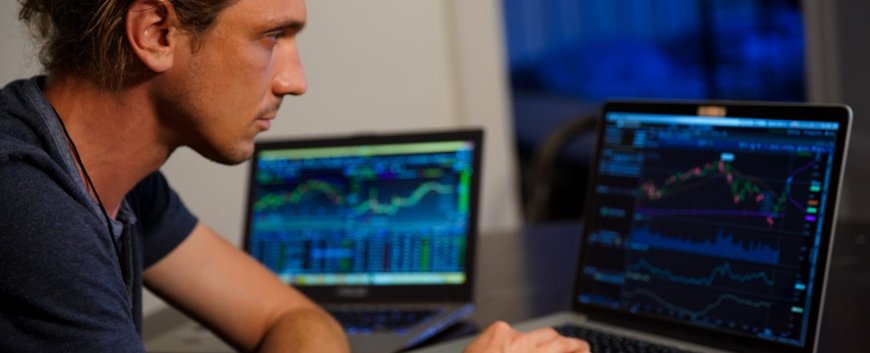The Danger of Overtrading: How Beginners Can Avoid Burning Out in Forex Trading Online
Over-trading can lead to burnout, and burnouts can lead to irrational decision-making that can greatly affect your overall trading. So, keep reading to learn how to manage over-trading!

When you first start your journey in forex trading online, it’s easy to get caught up in the excitement. You see opportunities everywhere — every chart, every currency pair, every little price movement seems like a chance to make money. But this enthusiasm can quickly lead to a common and dangerous mistake among beginners: overtrading.
Overtrading is when you take too many trades or risk too much on each one. It’s one of the biggest reasons new traders lose money and eventually burn out. In this article, we’ll explore why overtrading happens, how to spot the warning signs, and what you can do to protect yourself from falling into this trap.
What Is Overtrading?
Overtrading happens when you’re trading excessively — either by entering too many positions or trading too frequently without a solid reason. This usually happens when emotions take control instead of strategy.
For example, after a profitable trade, some beginners feel overconfident and immediately jump into another trade without proper analysis. On the other hand, after a loss, traders might try to “win it back” right away, which often leads to even bigger losses. Both situations create a dangerous cycle that can drain your trading account and your energy.
Why Do Beginners Overtrade?
-
Emotional Trading
Beginners often let emotions drive their decisions. Excitement, greed, or frustration can push them to trade impulsively instead of sticking to their plan.
-
Fear of Missing Out (FOMO)
Seeing others profit from a trade can create the urge to jump in late — even when the opportunity has passed. This can lead to poor entries and unnecessary losses.
-
Lack of a Trading Plan
Without a clear trading plan, it’s easy to open trades based on “gut feeling” rather than real market analysis. A plan gives you structure and limits your exposure.
-
Addiction to the Thrill
For some, the excitement of trading becomes addictive. The constant adrenaline rush of entering and exiting trades can make it feel like a game — until the losses pile up.
-
Misunderstanding Market Movement
The forex market is open 24 hours a day, five days a week. Many beginners mistake this for an endless opportunity, when in reality, not every moment is worth trading.
The Consequences of Overtrading
Overtrading isn’t just bad for your wallet — it also affects your mind. Here’s what happens when you push too hard:
-
Financial Losses: The more you trade, the more fees, spreads, and potential losses you accumulate.
-
Mental Fatigue: Constant chart-watching and stress can lead to burnout, making it hard to make clear decisions.
-
Poor Judgment: Exhaustion clouds your thinking, increasing the likelihood of emotional trading.
-
Loss of Confidence: After several failed trades, you might start doubting your abilities and lose motivation to continue learning.
In short, overtrading turns a disciplined activity into chaos. It’s like driving a car at full speed without brakes — you’re bound to crash eventually.
How to Avoid Overtrading
Avoiding overtrading takes awareness, discipline, and a clear plan. Here are some effective strategies:
1. Create a Trading Plan
Your trading plan should outline when you’ll trade, what setups you’ll look for, how much you’ll risk, and when you’ll stop. Stick to your plan no matter what happens. If there’s no valid setup, don’t trade — that's it.
2. Set Daily or Weekly Trade Limits
Decide in advance how many trades you’ll take per day or week. Once you hit that number, walk away. This prevents you from chasing losses or forcing trades that don’t meet your criteria.
3. Use a Trading Journal
Record every trade — including why you took it, how it turned out, and what you learned. Over time, you’ll start seeing patterns in your behaviour and be able to identify what triggers your overtrading.
4. Practice Patience
The best trades often take time to form. Train yourself to wait for high-probability setups rather than jumping at every movement. Remember: quality beats quantity.
5. Set Realistic Goals
Don’t expect to double your account overnight. Focus on small, consistent gains and long-term improvement. Unrealistic expectations are one of the biggest causes of overtrading.
6. Take Regular Breaks
Just like any other skill, your brain needs rest to perform well. Step away from the charts after a trading session, and don’t be afraid to take a few days off if you’re feeling burnt out.
7. Use Risk Management Rules
Limit how much you risk per trade — many traders use 1–2% of their capital. This helps protect your account even if you make multiple losing trades.
Building the Right Mindset
Successful forex trading online isn’t about how many trades you make — it’s about how smart your decisions are. Building patience and discipline is more valuable than chasing every opportunity.
Think of trading like fishing: if you cast your line constantly without waiting for the right moment, you’ll just scare the fish away. But if you wait patiently for the right conditions, your chances of success increase.
Every professional trader has learned to master this mindset. They understand that not trading can sometimes be the best trade of all.
Final Thoughts
Overtrading is a silent account killer that many beginners fall victim to. It drains your money, energy, and confidence — all because of impatience and emotional decisions. But the good news is that it’s completely avoidable.
By creating a solid trading plan, setting clear limits, and practising patience, you can protect yourself from burnout and develop the habits of a disciplined trader. Remember, forex trading online is a marathon, not a sprint. The goal isn’t to trade more — it’s to trade better.
Take your time, trust your plan, and remember: sometimes, the best trade is the one you don’t take.




























